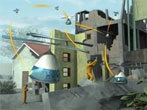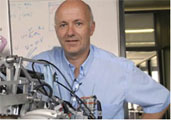
| home |
| location |
| organization |
| important dates |
| keynote speech |
| paper submission |
| registration |
| accomodation |
| online proceedings |
| final program |
| social program |
| picture gallery |

|
|
Keynote Speech Mobile Robots for Real World Applications: Design and Navigation Roland Siegwart 



Abstract Robots are rapidly evolving from factory work-horses, which are physically bound to their work-cells, to increasingly complex machines capable of performing challenging tasks. Such tasks are planetary exploration, driver support systems or helpers at our homes. They require robots to operate in unstructured and unpredictable environments. This talk will focus on design and navigation aspects of several robots, both wheeled and flying, that have been built by the author's research group towards addressing the many open challenges in this highly complex task. Our strategy has been a multi-pronged one, with several complex research issues being addressed, from size and energy efficiency to navigation in unstructured environments and the use of wheeled and flying robots as a means of effectively dealing with such scenarios. This research has lead to the development of several robot platforms that exhibit features useful in taking on the challenges of future mobile robot applications. RoboX is one such platform characterized by its capacity to safely navigate in densely populated areas and give tours to visitors. Eleven of these robots were deployed at the Swiss National exhibition Expo.02 in 2002. CRAB is the most recent addition to a family of exploration rovers that are best adapted for operating in very rough terrain and is currently one of the candidates for the ESA's (European Space Agency) ExoMars mission to Mars, scheduled for 2013. Research in flying robots, addressing issues relating to flight capability, miniaturization and energy considerations, has become an integral part of research at our lab, with constantly increasing importance; we view these robots as a very effective solution to dealing with hazardous environments such as areas affected by natural disasters such as earthquakes. With our micro-helicopters OS4 and muFly we approach autonomous flight in cluttered and very narrow indoor environments. The goal of the EU project muFly is thus, to develop a fully autonomous micro-helicopter of around 30 g and 10 cm of rotor diameter. It integrates highly miniaturized sensors and actuators developed at our partner's lab. The SKY-SAILOR is small fixed wing airplane expected to stay in the air indefinitely, thanks to its solar powered generator. It weights only around 2.5 kg and has a wing span of 3.2 m. 
Biographical Sketch Roland Siegwart is full professor for autonomous systems at ETH Zurich since July 2006. He has a Diploma in Mechanical Engineering (1983) and PhD in Mechatronics (1989) from ETH Zurich. In 1989/90 he spent one year as postdoctoral fellow at Stanford University. After that he worked part time as R&D director at MECOS Traxler AG and as lecturer and deputy head at the Institute of Robotics, ETH Zürich. In 1996 he was appointed as associate and later full professor for autonomous microsystems and robots at the Ecole Polytechnique Fédérale de Lausanne (EPFL). During his period at EPFL he was Deputy Head of the National Competence Center for Research (NCCR) on Multimodal Information Management (IM2), co-initiator and founding Chairman of Space Center EPFL and Vice Dean of the School of Engineering. In 2005 he hold a visiting position at NASA Ames and Stanford University. Roland Siegwart is member of the Swiss Academy of Engineering Sciences and board member of the European Network of Robotics (EURON). He served as Vice President for Technical Activities (2004/05) and is currently Distinguished Lecturer (2006/07) and AdCom Member (2007-09) of the IEEE Robotics and Automation Society. He is coordinator of two European Projects and co-founder of several spin-off companies. Homepage at ETH Zürich |
